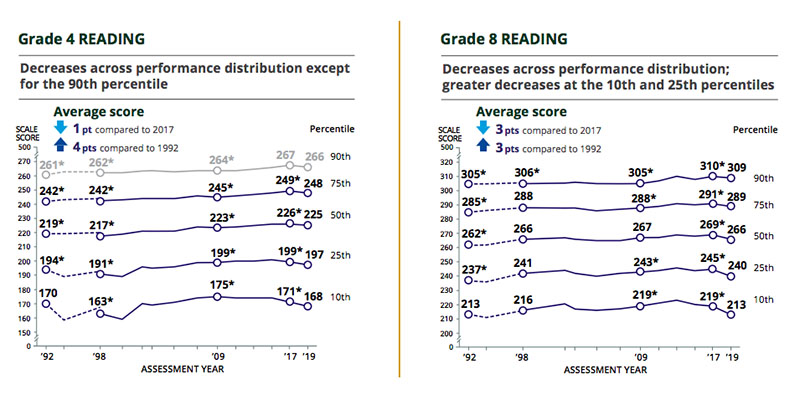Perdue: NAEP Scores Show We Failed Our Kids Again. It’s Time We Stop Saying We Believe in Education and Start Proving That We Do

As a nation, we are failing our students when it comes to ensuring they have a fundamental cornerstone for success in school and in life: the ability to read coherently and proficiently.
The release last month of the 2019 National Assessment of Educational Progress painted a stark picture for reading achievement in our country. Thirty-one states saw scores drop for eighth-grade reading achievement, and only Mississippi and the District of Columbia showed reading score improvements.
I’m disappointed. I’m beyond frustrated — in fact, I’m downright angry. But as a former teacher, longtime advocate for public education and NAEP board member, I’m not surprised.
We say as a nation that we enthusiastically support public education. However, over and over again, we fall short when it comes to investing in teachers, who are on the ground working with students every day. We also lag in support for parents, who are charged with reinforcing learning outside of school, to ensure they have the time and ability to work with their children at home.
Our teachers remain underpaid, undervalued and undersupported. Research from the Economic Policy Institute shows that when adjusted for inflation, average weekly wages of public school teachers decreased $21 from 1996 to 2018 — from $1,216 to $1,195 in 2018 dollars — even as weekly wages of other college graduates rose by $323 in the same period. This wage penalty has grown considerably in the past 30 years, from 5.3 percent in 1993 to 21.4 percent in 2018. In a 2019 Phi Delta Kappa poll of 2,000 teachers, just 10 percent said their community values them a great deal. Only 42 percent said their community values them a good amount, and 16 percent of teachers felt they are valued a little or not at all.
Even when teachers do feel adequately paid and valued by their communities, they are not sufficiently supported by state and federal legislators. Public funding for schools has declined dramatically over the past decade in a number of states, and funds for teacher professional development are often first on the chopping block in state budgets, including in my home state of North Carolina.
It’s no wonder, then, that half of teachers say they’ve seriously considered leaving the profession and our education system is facing a rapidly growing teacher shortage that will only continue to grow as the number of education degrees awarded each year decreases.
As teachers struggle to work in a system that does not value and support them, parents and caregivers are struggling to support children outside of school. This is especially true for parents of color and parents with lower income levels.
Parental involvement in their children’s schools has increased overall. Yet significant disparities exist, based on race, ethnicity, education and income levels, with white parents, parents who have more educational attainment and parents at higher income levels participating more in school meetings and volunteering more in schools.
This is not because parents of color or parents at lower income levels value education less, but rather because they are statistically less likely to have workplace supports, such as paid leave or flexible schedules, that allow them to participate in their children’s education. And high-quality childcare or preschool, which is essential to ensuring school readiness, is unaffordable or simply unavailable for many families across the country.
Now that we’ve created this perfect storm of undervalued teachers and undersupported parents, what should we do to fix it?
Education and community leaders across the country, at all levels, must make high-quality public education a priority. That means:
● Support our teachers. We must:
ဝ Pay them a professional salary if we want to attract and retain the best and the brightest.
ဝ Invest in teachers’ professional growth by providing them with rigorous and relevant professional development so teachers can be lifelong learners in the same way we expect students to be.
ဝ Fund schools at a sufficient level to provide teachers with the supplies, tools and working conditions they need to help their students succeed.
ဝ Provide all teachers with high, 21st century curriculum standards, and then give them the autonomy and accountability to prepare every child to succeed in a global community.
● Make reading literacy and mathematics in K-3 a priority, and ensure students have the foundational knowledge they need for sustainable, long-term success.
● Fund high-quality pre-K programs to ensure that all children are ready for kindergarten, and expand access to high-quality childcare for families of babies and toddlers, so children are supported from birth and come to kindergarten ready for school.
It’s time we stop saying we believe in high-quality education for all students and start demonstrating that we are committed to it by supporting teachers, schools and parents in ways that set all children up for success.
Bev Perdue is a former public school teacher, a former governor of North Carolina and a NAEP board member. She is the founder of digiLEARN, a national nonprofit dedicated to accelerating digital learning for all ages with a goal of increasing personal learning options for students and expanding instructional opportunities for teachers.
Get stories like these delivered straight to your inbox. Sign up for The 74 Newsletter

;)